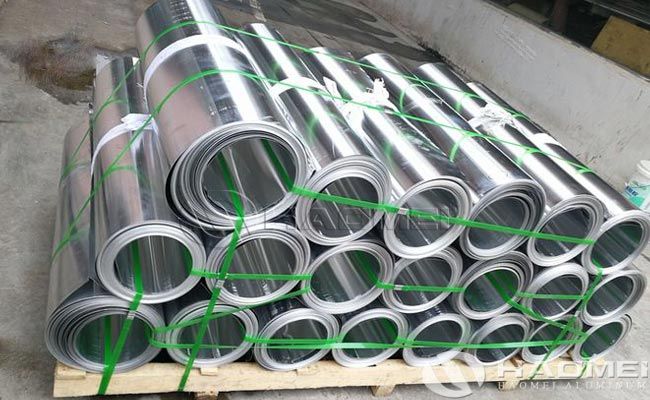Plain aluminium cladding sheet for thermal insulation applications are a common thermal insulation material, possessing advantages such as lightweight, corrosion resistance, high thermal conductivity, and ease of processing.

Common alloys of plain aluminium cladding sheet:
- 1050 aluminum coil:
Contains over 99.5% aluminum, exhibiting excellent thermal conductivity for efficient insulation. It also boasts good processing performance and corrosion resistance, easily meeting various processing requirements and suitable for general insulation projects.
- 1060 aluminum coil:
Made from industrial pure aluminum with an aluminum content ≥99.6%, it possesses excellent ductility and plasticity, adapting to various complex construction environments, such as insulation of circular pipes and irregularly shaped tanks. It is an economical choice for conventional insulation scenarios.
- 1100 aluminum coil:
Contains 99.00% aluminum, with a high thermal conductivity coefficient, providing good insulation performance. It also exhibits strong corrosion resistance and good processing performance, allowing for the production of various aluminum materials through pressure processing.
- 3003 aluminum coil:
Belonging to the aluminum-manganese alloy family, it boasts advantages such as rust resistance, light weight, high strength, and good durability. Its coating exhibits strong weather resistance and is commonly used in insulation projects with high rust prevention requirements, such as pipeline insulation in chemical plants and power plants.
Specifications of plain aluminium cladding sheet:
Thickness:Generally between 0.3mm and 1.0mm, with 0.3mm, 0.4mm, and 0.5mm being the most common thicknesses. Pipe insulation typically prioritizes a thickness of 0.3-0.5mm, while building and heavy equipment insulation often uses 0.6-0.8mm.
Width: Common widths are 1000mm and 1200mm, but other widths are also available to meet the needs of different projects.
Characteristics of plain aluminium cladding sheet:
- Thermal conductivity: Aluminum has excellent thermal conductivity, effectively transferring heat and enhancing insulation performance.
- Corrosion resistance: The naturally formed oxide layer on the aluminum surface effectively resists corrosion, making it suitable for use in humid or corrosive environments.
- Lightweight: Aluminum has a low density, reducing the overall weight of the structure and facilitating transportation and installation.
- Formability: Aluminum cladding sheets can be processed into various shapes using different methods (such as stamping and bending) to meet diverse insulation needs.
- Aesthetics: Aluminum surfaces can undergo various surface treatments (such as spraying and anodizing) to improve aesthetics and durability.
Applications of plain aluminium cladding sheets:
- Building insulation: Suitable for exterior walls and roofs of industrial plants, cold chain logistics centers, and apartment buildings. When combined with sandwich panels, it effectively blocks the penetration of hot and cold air, reducing energy consumption.
- Pipeline insulation: As an outer protective material for municipal heating, oil and gas, and chemical fluid transportation pipelines, it prevents water ingress and failure of the insulation core material, ensuring stable medium transportation and reducing heat loss.
- Equipment insulation: Can be used for insulation of equipment such as boilers, reactors, and cold storage facilities. It can operate stably in environments ranging from -40℃ to 120℃, resisting equipment vibration and environmental corrosion.
Plain aluminium cladding sheet easily form a dense oxide film on their surface, resisting corrosion from air and moisture. Under natural conditions, their service life can reach over 20 years. Recycled aluminum have high furnace value, with at least 80% recyclable. This is more economical than materials like steel and meets environmental protection requirements.
live:onlinehcx